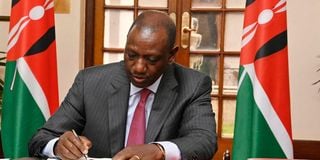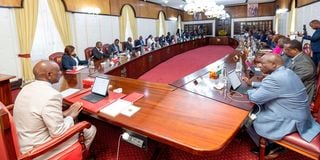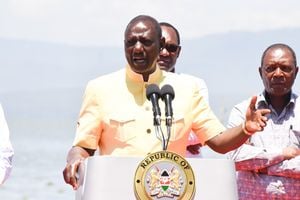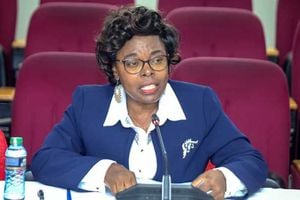
President William Ruto assents to the Supplementary Appropriation (No.3) at State House, Nairobi in November 2023.
On July 31, 2023 Kirinyaga County awarded Shiloki Enterprises Ltd a contract to supply it with an executive chair for governor Anne Waiguru’s office, and parted with Sh648,000 for the furniture.
While the amount is still dwarfed by the Sh1.1 million presidential chair Siaya County purchased for deputy governor William Oduol, the Kirinyaga seat is still expensive by any yardstick.
Just a month later, Homa Bay County paid Rayte Travel Agency Sh522,000 to hire a chase car for Governor Gladys Wanga’s motorcade for one month.
At the Kenya Plant Health Inspectorate, Dominance Capital Ltd and Haddie Supplies were awarded contracts to supply two Samsung smart TVs for managing director Theophilus Mutui’s office. Haddie also supplied a visitor’s book and a day planner.
Dominance Capital pocketed Sh265,720 as Haddie was paid Sh172,500.
And in November, State House hired Imathere Investments to supply it with a digital watch, in a contract worth Sh750,000.
These are just but a few of hundreds of curious spends by national and county governments that have declared their financial data to the public procurement regulator in the 2023/24 financial year.
From fine dining during mundane meetings in some of the country’s finest hotels, to buying expensive furniture and appliances, some institutions are burning millions on items and services that even top executives in blue chip companies only dream of.
By the time of going to press, Government Spokesperson Isaac Mwaura was yet to respond to our queries on what policies the Kenya Kwanza administration intends to put in place to avoid frivolous spending by public institutions.
State House spokesperson Hussein Mohamed told Nation that President William Ruto has already started cutting down wastage by government in his first two years in charge, and said that there will be more plugs to stop unnecessary spending.
Mr Mohamed cited the President’s recent meeting with State corporation bosses as a key moment in the journey.
“The President has been clear. When he came in, things were tough both here and globally. He has always said that for Kenya to get out of this mess, we need to live within our means. In the first financial year, he cut the number of trips by government officials, both in number and delegation size, and he led from the front. He travels with a very lean team,” Mr Mohamed said.
He added that the recent ban on promotional items is just one of many decisions to come and which are aimed at cutting spending.
Also Read: Controller of Budget report sparks alarms over salaries and travel splurge by county governments
When Head of Public Service Felix Koskei banned government agencies from procuring promotional items last week, he barely scratched the surface on the gravy train a section of civil servants has been riding.
Interestingly, State House, which green lit Mr Koskei’s ban on promotional items, has spent Sh3 million on branded, heavy duty umbrellas this financial year alone. It has also spent money on other branded items.
Data made public by the public procurement regulator indicates that several institutions, at both national and county level, are spending big to keep their staff comfortable, as President William Ruto struggles to implement austerity measures he promised in the 2022 election campaign trail.
Busia County has spent over Sh23 million on conferences, outside catering, accommodation and other hospitality services, all of which was in establishments within the devolved unit.
At the Kenya National Highways Authority, over Sh12 million was spent on conferences and outside catering.
The agency spent Sh1.7 million to hold a conference at Travellers Beach Hotel in Mombasa for review of its accounts department’s performance. It spent another Sh1.7 million for a conference at the Lake Naivasha Simba Lodge to prepare for a Parliamentary appearance.
Some Kenha staff also burnt Sh1.6 million in a conference at the Maasai Mara Sopa Lodge as they held a conference for review of road design manual standards.
Another conference at the Naivasha Country Lodge cost Sh686,000 with the agenda being to discuss findings of a public participation exercise.
The State Department for Planning, under the National Treasury, also spent over Sh12 million on conferences, with most of those listed in the procurement portal not being tagged with an agenda for the out-of-town excursion.
For the Teachers Service Commission, a conference to develop the TSC Amendment Bill cost Sh1.3 million at the Safari Park Hotel in Nairobi.
The millions quoted in the procurement portal do not include transport to and from the hotels, and allowances where applicable.

President William Ruto chairs a past Cabinet meeting at State House in Nairobi.
“That (scrutiny of out-of-town conferences by government agencies) is the function of Parliament. I would rather they cap the money spent, not number of trips,” Mr Kwame Owino, an economist and CEO of Institute of Economic Affairs, opined.
Mr Owino indicated that capping the amount of money government institutions can spend on conferences and other such platforms, could help tame the runaway costs taxpayers bear by footing the bill in expensive hotels.
In Vihiga County, Sh975,000 was spent on kitchen appliances for the official residence of Speaker Christopher Omulele, as Kajiado County spent Sh2 million on a retreat and team building exercise for MCAs.
In Mombasa, the Kenya Maritime Authority used Sh2 million for its team building excursion.
This was as the Kenya Tourism Board spent over Sh1 million on its staff end-year party. This amount included accommodation for some of its staff. That amount was topped by the Anti-Counterfeit Authority, which spent Sh1.9 million on its end-year party for 2023.
At the time Mr Koskei issued the ban on procurement of promotional items, hundreds of government institutions had already gone big on corporate uniform, branded clothes, diaries, calendars and other non-essential items or services.
Siaya County, for instance, bought an undisclosed number of corporate shirts at Sh3 million. The Lake Victoria North Water Services Board paid Sh1.2 million for calendars.
About 100 institutions that have declared their procurement-based spending for the financial year ending June, 2024 have allocated Sh87.5 million to branded items.
Makueni County is one of the biggest spenders in this regard, as it used Sh6 million to buy branded t-shirts and lesos from Kay Links Enterprises.
Of those that have declared their spending, State House, Nyayo Tea Zones Development Corporation, the Office of the Data Protection Commissioner, Kenya Bureau of Standards, National Authority for the Campaign Against Alcohol and Drugs Abuse, Micro and Small Enterprise Authority, Kenya Export Promotion and Branding Agency, Women Enterprise Fund and Siaya County have each spent over Sh2 million on branded items.
The President’s Award–Kenya, Kenya Institute for Policy and Research Analysis, Lake Victoria North Water Services, Commission for University Education, Busia County, Kirinyaga University, Kenya Institute of Supplies Management, the Kenya National Highways Authority and Kenya Literature Bureau have each spent more than Sh1 million on promotional items.
“Branding tends to be for institutions which have competitors. So this idea of branding government, which doesn’t have competition, points at agenda-driven procurement. For instance, there is someone with umbrellas he or she needs to sell, and we procure them. We have been caught hostage by agenda-driven procurement. Scrutiny at both national and county levels has failed,” Mr Owino said in a phone interview.
The economist has dismissed the argument that government needs to do such procurement to keep businesses afloat, holding that priorities have just been misplaced.
“That argument is fake. If you have Sh3 million, you could use it to buy umbrellas or to employ doctors, or build classrooms. It is just an issue of priorities. You ask yourself, is it worth spending Sh3 million on umbrellas, or building classrooms? That (Sh3 million) is equivalent to salary for 30 doctors. In my view it is just a failure on oversight and capture of procurement by corrupt individuals,” Mr Owino added.
Mr Nyukuri Barasa, a leadership and governance consultant, said that public officers who spend on the most expensive items and services without regard to taxpayers should step aside and await a close on investigations on whether there was wilful misuse of money.
He added that those found to have intentionally gone for expensive options that are of no additional value to the taxpayer should be surcharged.
Of the 8,829 procurement instances listed on the regulator’s portal, which represents a small fraction of all national and county government institutions, the Nation identified over Sh200 million spent on non-essential items or services in the financial year that ends in June 2024.












